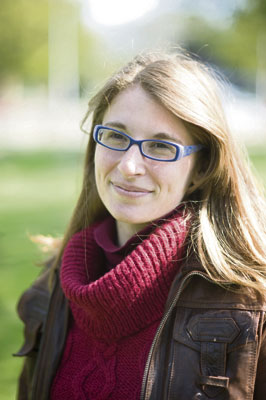Name: Olga di Ruggero (29)Nationality: ItalianSupervisor: Assistant professor Alexander de Haan (TPM) Subject: Public acceptance of hydrogen as a future energy carrierThesis defense: In two years“Hydrogen, like other biofuels, is not an energy carrier that exists in nature.
Instead, we must produce, store, distribute and use hydrogen, which can be done in all kinds of different ways. To mention a few examples: hydrogen can be produced using fossil fuels, renewable sources or nuclear energy. It can then be stored as a gas, a liquid or in solid form, and it can be distributed with trucks or pipelines or be produced at the same place we use it, such as, for example, in planes, houses or mobile phones. If you think about it, hydrogen is not only a technology; it is also a lot of possible futures. I’ve explored all these possible options and created future scenarios.
When you ask a person what he/she thinks about a particular scenario, that person will always like and dislike a certain part of it, depending on what he/she thinks is important. In other words, their opinion will be based on whether the scenario will help to solve certain problems concerning energy and sustainability. But if you ask five people what these problems with energy are, they will come up with five different answers, varying from global warming to air pollution to a lack of fossil fuels.
All these different views on what the problem is can be reasons for people to change to new technologies, like hydrogen. However, acceptance problems will arise if you want to realize a future that does not address and solve the problems a person thinks are important. On the other hand, people with contrasting views about problems can agree on the same hydrogen future.
I’m interested in who likes what future and why; therefore, I’m looking for parties and coalitions within the public. In particular I’m curious how lay people, people from the street, agree with experts on hydrogen.
More generally, you can think that hydrogen will be accepted because of environmental reasons or rejected because of safety issues, but this picture of reality is far too generic and the public is not a one-headed entity with one opinion. Because we all have different values, beliefs and norms, I am therefore making the discussion about public acceptance more complex and clearer at the same time.
Personally, I don’t know whether or not there will be a hydrogen economy, although this research has certainly changed my opinion on sustainability. We’re now focusing too much on climate change by trying to reduce CO2, but the way we’re doing this is not always sustainable. Sustainability is more than climate change; it’s also about whether our natural resources, like forests, will be available for future generations or not. Sustainability has to do with the way we live.
During my years studying psychology in Italy, I had always wanted to do a PhD. But it would not have been possible to do this in Italy, because the people there are not so open to this kind of research. Besides, my country of birth is much more hierarchical. At the faculty of Technology, Policy and Management, they treat me as a colleague and encourage me to discuss my ideas with others. People here are so amazingly interested!”
Het steunpunt, dat studerende ouders helpt met het combineren van stusdie en gezin, is blij met de erkenning. “Maar het zet geen zoden aan de dijk”, aldus oprichter Annemiek de Jong.
Dat hulp van een expertisecentrum als het Steunpunt Studerende Moeders nodig is, blijkt uit de slaagcijfers van studenten die een eenoudertoeslag krijgen. Een groot deel van hen – meestal moeders – verlaat de universiteit (43 procent) of hogeschool (24 procent) zonder een diploma.
De Jong is ‘heel blij’ met de subsidie van Plasterk – vijftigduizend euro voor 2009 en 2010. “Voor het eerst heb ik het gevoel dat de minister het probleem echt erkent. De afgelopen drie jaar heb ik dit werk geheel vrijwillig gedaan. Nu kan ik een werkruimte regelen en de taken verdelen.”
De Jong had echter liever gezien dat het ministerie haar wat werk uit de handen had genomen. “Er moeten landelijke regelingen worden getroffen. Alleenstaande studerende moeders zijn nu afhankelijk van de bereidheid van de instellingen”.
Volgens haar is er geen enkele hogeschool of universiteit die een speciale regeling heeft voor alleenstaande studerende ouders, zoals die er wel is voor topsporters.
Het aantal studenten dat één of meer kinderen heeft, is niet bekend. Wel zijn er cijfers over het aantal studenten dat een eenoudertoeslag ontvangt van de IB-groep. Aan de universiteiten zijn het er dit jaar 210 (0,2 procent), in het hbo 1723 studenten (0,8 procent).
Volgens De Jong is dat ‘het topje van de ijsberg’. Studerende ouders met partners, of alleenstaande ouders die in deeltijd studeren, komen niet in de statistieken voor.



Comments are closed.